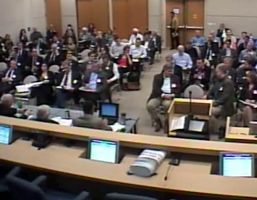 California Air Resources Board (CARB) staff spent four hours on Tuesday afternoon detailing reviews made of Indirect Land Use Change (iLUC) models and analysis for the state’s Low Carbon Fuel Standard (LCFS), strongly stressing that their results are preliminary.
California Air Resources Board (CARB) staff spent four hours on Tuesday afternoon detailing reviews made of Indirect Land Use Change (iLUC) models and analysis for the state’s Low Carbon Fuel Standard (LCFS), strongly stressing that their results are preliminary.
“This is a work in progress,” said Air Resources Engineer Anil Prabhu as he began his power point presentation detailing the history of the iLUC analysis used by the agency, recommendations by the Expert Work Group (EWG), and much technical scientific information. Staff also stressed repeatedly that CARB is seeking feedback from all stakeholders on the preliminary conclusions presented.
 The 84 slide presentation of details on how CARB arrived at the values they are proposing for corn ethanol, sugarcane ethanol, soy biodiesel, canola biodiesel and sorghum ethanol was interspersed with dozens of questions from stakeholders and scientists present or listening in on the webcast.
The 84 slide presentation of details on how CARB arrived at the values they are proposing for corn ethanol, sugarcane ethanol, soy biodiesel, canola biodiesel and sorghum ethanol was interspersed with dozens of questions from stakeholders and scientists present or listening in on the webcast.
Among those challenging the CARB results several times was Steffen Mueller with the University of Illinois-Chicago and Genscape, a member of the original CARB EWG. “There’s a lot of basic information missing (here) to engage in a productive discussion,” Mueller said, noting that the Agro-Ecological Zone – Emissions Factor (AEZ-EF) model presented was from 2011 and wondering when they would be able to see the updates CARB made to the model. “There’s been a lot of republications since 2011,” he said, to which CARB staff responded it would be updated “probably within the next week or two.”
Much of CARB’s data was presented based on Purdue University’s GTAP (Global Trade Analysis Project) work, including some research done by agricultural economist Wally Tyner, who called in to set the record straight. “What’s been presented today is really CARB’s work and not Purdue’s work,” said Tyner, who mainly called to dispute the Yield Price Elasticity assumptions made in the CARB presentations, which he says is “basically incorrect.” Wally Tyner comments and CARB staff response
Tyner also noted that there “is a lot of uncertainty in emission factors” as well as a great deal in land use change, and that seemed to be the theme of the entire meeting with nearly a quarter of the power point presentation being devoted to “Evaluation of Uncertainty” and “Why Results Vary Between Studies.” While the CARB staff repeatedly reminded those present that they welcomed any new or updated data that could be supplied, it was overwhelmingly clear that there is no scientific consensus whatsoever on the topic of indirect land use change.
Renewable Fuels Association Senior Vice President for Research and Analysis Geoff Cooper listened to the majority of the workshop by phone and called in to ask questions and make observations. “I think the workshop demonstrated that CARB continues to lag behind the rest of the scientific community on the issue of iLUC,” he said afterward. “While iLUC analysis remains highly uncertain and assumption-driven, there is growing consensus that the best available estimates for use by CARB would be 50-80% lower than the agency’s current estimate. Yet, CARB is initially proposing to lower the number only 20% based on some highly questionable assumptions about certain elasticities in the GTAP model. It should be alarming to stakeholders that CARB is rejecting the advice of the experts who created GTAP and run that model every day.”
CARB is asking for feedback on the preliminary presentation by the end of March and plans to schedule one or two additional workshops in the coming months before completing an Independent Academic Review and presenting final report to the board in the fall. “Thank you for attending the LCFS opening ceremonies,” said CARB Transportation Fuels Branch Chief Michael Waugh at the conclusion of the workshop.

